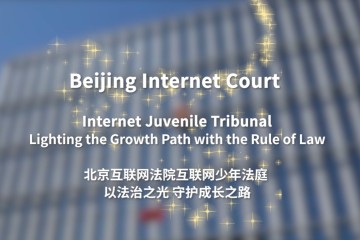Case studies, highlights of SPC provisions on online consumption cases
In response to the new issues reflected in online consumption-related cases arising from the booming development of the digital economy, the Supreme People's Court (SPC) recently issued provisionson the specific application of law in the trial of cases involving online consumption disputes, which took effect on March 15, 2022. Judges from the Beijing Internet Court (BIC) gave interpretations of the provisions via case studies, which were published in Beijing Daily on March 16.
Case 1. Once unpacked or tried, can a purchase be returned within seven days unconditionally?
Unlike shopping in stores, online consumers rely heavily on the online stores' description of goods or services in accessing product/service information. China's law on protection of consumer rights and interests sets out the rules regarding goods returns and refunds within seven days and specifies to which categories of goods the rules apply or do not apply.
To better protect consumers' rights and interests in after-sale services, the recently-issued provisions further clarify that if consumers unpacked the goods out of inspection necessity and left it intact, the e-commerce business operators cannot deny the consumers the right to return the goods for a refund within seven days unconditionally by claiming the product was already unpacked, unless otherwise stipulated by law.
The judicial practice questions remain, however, of how to determine that it is "necessary" to inspect the goods, whether the goods "remains intact" after inspection, and whether the return and refund within seven days policy still applies to the unpacked goods.
A plaintiff surnamed Liu bought a printer from an e-commerce platform. Upon receiving it, Liu did some test printing and found it unsatisfactory. Liu then requested the e-commerce platform to accept a return and issue a refund of the purchase price. The platform's request to check the printer was denied by Liu. The platform declined Liu's request for return of the printer and a refund based on the grounds that the packaging was missing and the printer was already used, which would impact its resale value. Liu thus sued the e-commerce platform at the BIC claiming infringement of consumer rights.
After trial, the BIC concluded that, being a product with consumable materials (in this case, the toner and the cartridge) which have a high cost, once activated or tried the printer would suffer major value loss and thus the unconditional goods return and refund within seven days policy did not apply. Besides, the e-platform had no way to check the status of the printer due to Liu's refusal to allow it. Therefore, the court found that Liu's application for return and refunding was unfounded.
In that case, the printer, an office consumable, had been used and was not able to be restored to its original form. Therefore, its purchase was excluded from the unconditional return and refund within seven days policy. Other similar commodities include skincare, cosmetics and electronic devices. Once opened or activated, whether the return and refund within seven days policy is applicable should be determined by combined considerations such as product attributes, packaging appearance, inspection norms, value lost in unsealing and restoration difficulties.
Case 2. How to resolve disputes over faked online orders?
The booming technology also brought side effect such as apps that fake online orders or give unreal positive reviews and viewcounts, which is immoral and undermines the social public interest.
To encourage honesty and integrity, the provisions specify that a contract between an e-commerce operator and others for false publicity by means of faked orders, fake viewcounts and fake user reviews shall be deemed invalid by courts.
A plaintiff surnamed Li was acquainted with the defendant surnamed Wang, who was the legal representative of an e-commerce company. Upon mutual agreement, Li did fake transactions with Wang's company in order to falsely increase the company's sales performance. The company was expected to cover Li's related expenses and reward Li with a bonus. However, the company failed to pay Li on the grounds of a tight budget. Li thus sued the company at the BIC claiming reimbursement of his costs in making the false orders and the promised bonus.
After trial, the BIC determined that the contract signed between Li and the company attempted to increase the company's sales volume and reputation via illegal behavior of faking orders, which severely undermined consumers' rights to know and to choose, and the market order of online transactions. Therefore, the contract was deemed invalid. In its final judgment, the BIC decided that the plaintiff Li should be refunded his disbursements made on the faked orders but denied his bonus claim.
Case 3. Disputes on identity confusion between livestream account operators and actual sellers
As a rapidly emerging business model, livestream marketing brings up issues that can undermine consumers' rights. The new provisions specifies that if staff of a livestream operator infringe consumer rights with false publicity information during a livestream selling session, courts should support consumer claims against the livestream operator for compensation.
Regarding the issue of identity confusion between livestream operators and actual sellers, the provisions specify that if a livestream operator fails to prove that it had indicated that it was not a seller and identified the actual seller in a way sufficient for consumers to distinguish those two parties, courts should support a consumer claim that the operator should bear the seller’s responsibility. That means consumers are entitled to hold livestream operators responsible if the operators fail to indicate the identity of the actual sellers in a sufficiently distinguished manner during livestream marketing.
In practice, livestreamers build trust in potential consumers by sales pitches that yield transactions. Accordingly, livestreamers have the duty of care to identify the actual seller during the livestreaming to avoid identity confusion, and to make sure there is no false publicity information.
Case 4. Disputes arising from failures to provide notification of online store ownership transfer
Given the virtual nature of online stores, consumers generally determine the business entity of an online store through the information disclosed online. In practice, in cases of failure to notify consumers of legal transfer of online business accounts and stores, the principle of protecting consumers to the greatest extent should be followed to sustain their trust.
As stipulated in the provisions, when those who register online business accounts to open online stores transfer the accounts and stores to others by agreement but fail to publicize the information as a business entity change, in case of rights infringements courts should support consumer claims against both the registered operator and the actual operator.
A plaintiff surnamed Wang bought a cell phone at an online store owned by the defendant surnamed Sun. Upon receiving the phone, Wang found out it was inconsistent with the agreement. Wang then contacted the store which acknowledged the delivery mistake and promised to make another delivery. However, the second shipment was still a wrong model. Wang tried to contact the store again, which stopped responding. Wang thus sued Sun at the BIC, requesting a refund of the purchase price. Sun claimed that the store was already rented out to a third party so Sun shouldn’t be responsible. The evidence before the court was that the store was still registered under Sun’s name so Sun should assume the obligations as the store owner.
Other highlights of the provisions:
1. Signing for receipt of goods is not equivalent to acknowledging the quality of the goods.
2. Sellers are also responsible for gift-related rights infringement.
3. Promises of ten times the purchase price for compensation in cases of product inferiority should be enforceable.
4. Online business operators may be parties to disputes even when payment is carried out on a channel other than those provided by the trading platform.
5. Food takeout platforms should be held accountable for failing inspection obligations.

 Judicial White Paper
Judicial White Paper
 Play
Play Play
Play Online Lawsuit Guide
Online Lawsuit Guide Beijing Internet Court Lawsuit Service WeChat Account
Beijing Internet Court Lawsuit Service WeChat Account  Beijing Internet Court WeChat Account
Beijing Internet Court WeChat Account